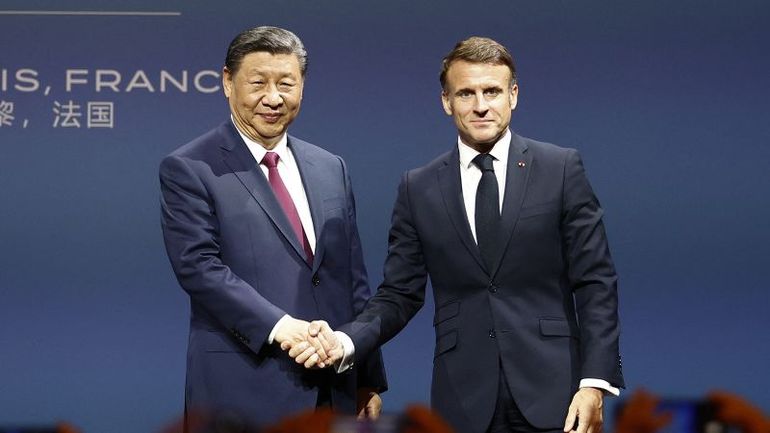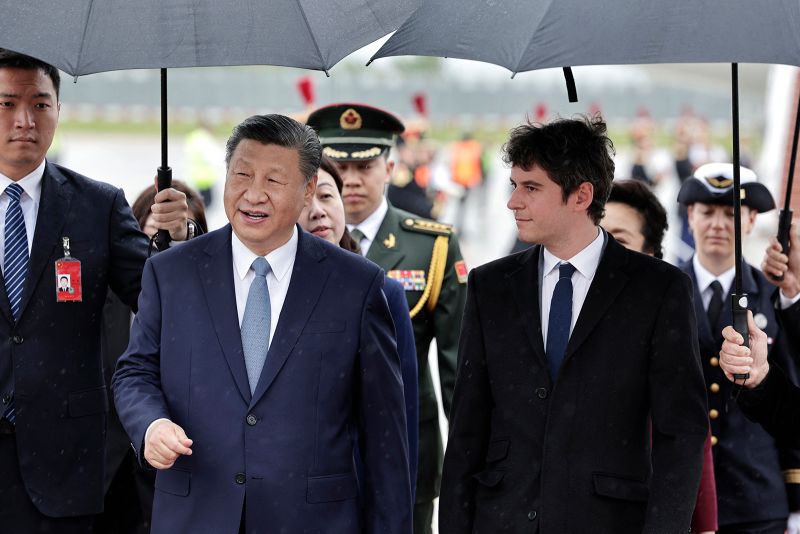
Xi Jinping's Diplomatic Stand in Europe Amid Ukraine Conflict

Xi Jinping addresses accusations of Chinese support for Russia's actions in Ukraine during discussions with European leaders.
Xi Jinping addressed allegations of China's support for Russia's war in Ukraine during his meetings with European leaders. The Chinese leader is currently on a six-day visit to Europe, where tensions between China and Europe are high due to concerns about Beijing's close ties with Moscow.
During a joint press conference with French President Emmanuel Macron in Paris on Monday, Xi stated, "China is neither the creator of the crisis, nor a party to it or a participant. But we are also not a bystander, we have always been actively contributing to reaching peace." The press conference followed a day of meetings that also included discussions with European Commission President Ursula von der Leyen.
Xi also emphasized that it is important not to use the Ukraine crisis as a way to shift blame or tarnish the reputation of another country, potentially sparking a new Cold War. This was in response to accusations from the United States regarding the alleged role of Chinese exports, such as machine tools and microelectronics, in supporting Russia's defense industry.
Following the conflict, tensions between Europe and China escalated due to trade disputes and concerns about China's global aspirations. This was exacerbated by Beijing's decision not to denounce the invasion of Ukraine, instead becoming a crucial supporter of the heavily sanctioned Russian economy.
Xi's visit to Europe is seen by Beijing as a chance for him to share China's perspective on the conflict in Europe with European leaders. This visit also aims to highlight differences in views between Washington and its European allies.
During the trip, Xi will also visit Serbia and Hungary. In Belgrade, he will commemorate the 25th anniversary of the NATO bombing of the Chinese embassy, where three people lost their lives.
The Chinese people value peace and will not tolerate a repeat of past tragedies. President Xi mentioned in an article for Serbian media that the bond between the people of China and Serbia, forged through shared experiences, will inspire progress for both nations.
The NATO bombing in the Balkans in 1999, which the US claimed was accidental, intensified China's longstanding distrust towards the alliance. This incident has contributed to China's closer relationship with Russia in recent years.
American officials have expressed concerns to Chinese counterparts about dual-use goods exported from China to Russia. They believe that these goods are helping Russia strengthen its defense industry as it carries on with its attacks on Ukraine. Xi's visit to Africa coincides with these allegations.
China is offering substantial support to Russia, including machine tools, drone and turbojet engines, technology for cruise missiles, microelectronics, and nitrocellulose. These are essential for Russia to produce propellant for weapons, according to senior officials from the Biden administration.
Beijing has justified its trade relationship with Russia as a normal part of bilateral relations. They have emphasized that they do not supply weapons to conflicting parties. There have been no allegations of China sending lethal weapons to Russia, but rather items with military applications.
French Prime Minister Gabriel Attal greets Chinese leader Xi Jinping upon his arrival at Orly airport, south of Paris on May 5, 2024.
French Prime Minister Gabriel Attal greets Chinese leader Xi Jinping upon his arrival at Orly airport, south of Paris on May 5, 2024.
Stephane De Sakutin/Pool/AFP/Getty Images
Related article
China’s President Xi Jinping is making his first visit to Europe in five years. However, his trip is expected to be challenging. French President Macron mentioned that during their discussions, Xi reaffirmed a promise he made a year ago. This promise involves refraining from sending weapons and assistance to Moscow. Additionally, Xi committed to closely monitoring China’s exports to prevent the sale of items that could be used for military purposes.
Macron expressed his reassurance about the length and quality of their discussions on the subject during their joint press conference. He also thanked Xi for agreeing to visit France before an anticipated visit from Russian President Vladimir Putin to Beijing in the near future. This would allow Europe to clearly convey its stance on Russia’s actions in Ukraine and show its willingness to support Kyiv for as long as necessary.
Xi and Macron have jointly proposed a global Olympic truce, urging for a halt in all conflicts during the upcoming Summer Games in Paris.
In addition, Xi has also urged for a ceasefire in the Israel-Hamas war, emphasizing the urgent need for an immediate and lasting cessation of hostilities. Xi and Macron have released a joint statement highlighting the importance of providing humanitarian aid, protecting civilians, and ensuring the prompt and unconditional release of hostages.
Xi's visit to Europe coincides with ongoing concerns about the potential escalation of the war. Russian President Vladimir Putin has recently instructed Russian forces to practice deploying tactical nuclear weapons in response to perceived threats from the West.
Following her meeting with Xi and Macron, von der Leyen expressed her gratitude for Xi's role in calming Russia's nuclear threats. She stated her confidence in Xi's continued efforts to address the ongoing situation.
Von der Leyen emphasized the importance of China's influence on Russia to halt the aggression towards Ukraine. She highlighted the need for increased measures to prevent the transportation of dual-use goods to the battlefield.
Russian President Vladimir Putin attends the Congress of the Russian Union of Industrialists and Entrepreneurs in Moscow, Russia April 25, 2024. REUTERS/Evgenia Novozhenina
Russian President Vladimir Putin attends the Congress of the Russian Union of Industrialists and Entrepreneurs in Moscow, Russia April 25, 2024. REUTERS/Evgenia Novozhenina
Evgenia Novozhenina/Reuters
Related article
Putin has ordered drills for tactical nuclear weapons in response to Western ‘threats’. Despite claiming neutrality in the conflict and trying to be seen as a peacemaker, Beijing has not shown much effort in using its influence with Russia to help move towards a resolution preferred by Europe.
Xi is known for being cautious about not undermining Putin, whom he views as a crucial ally in countering US "containment." Analysts widely acknowledge this perspective.
On Monday, Xi emphasized China's stance on the conflict, urging all parties to engage in dialogue and build trust gradually.
He is also showing resistance to peace conferences that do not involve Russia, like the upcoming one in Switzerland. He stated that Beijing backs initiatives that are acknowledged by both Russia and Ukraine, ensuring fair discussions on all potential peace plans during the conference.
Reporting for this article was contributed by CNN’s Shawn Deng and Wayne Chang.
Editor's P/S:
Xi Jinping's visit to Europe highlights the complex geopolitical dynamics between China, Europe, and Russia. While China emphasizes its neutrality in the Ukraine conflict, its close ties with Russia and its support for Moscow's economy have raised concerns among European leaders. The allegations of China supplying Russia with dual-use goods for military purposes further strain the relationship between China and Europe.
Xi's visit aims to present China's perspective on the conflict and to mend relations with Europe. However, the ongoing concerns about China's support for Russia and the broader geopolitical tensions between the West and China make it unlikely that Xi's visit will fully resolve the differences between the parties. The upcoming peace conference in Switzerland, which China has expressed reservations about, will be a crucial test of whether China is willing to play a more active role in mediating the conflict and easing tensions between Russia and the West.















